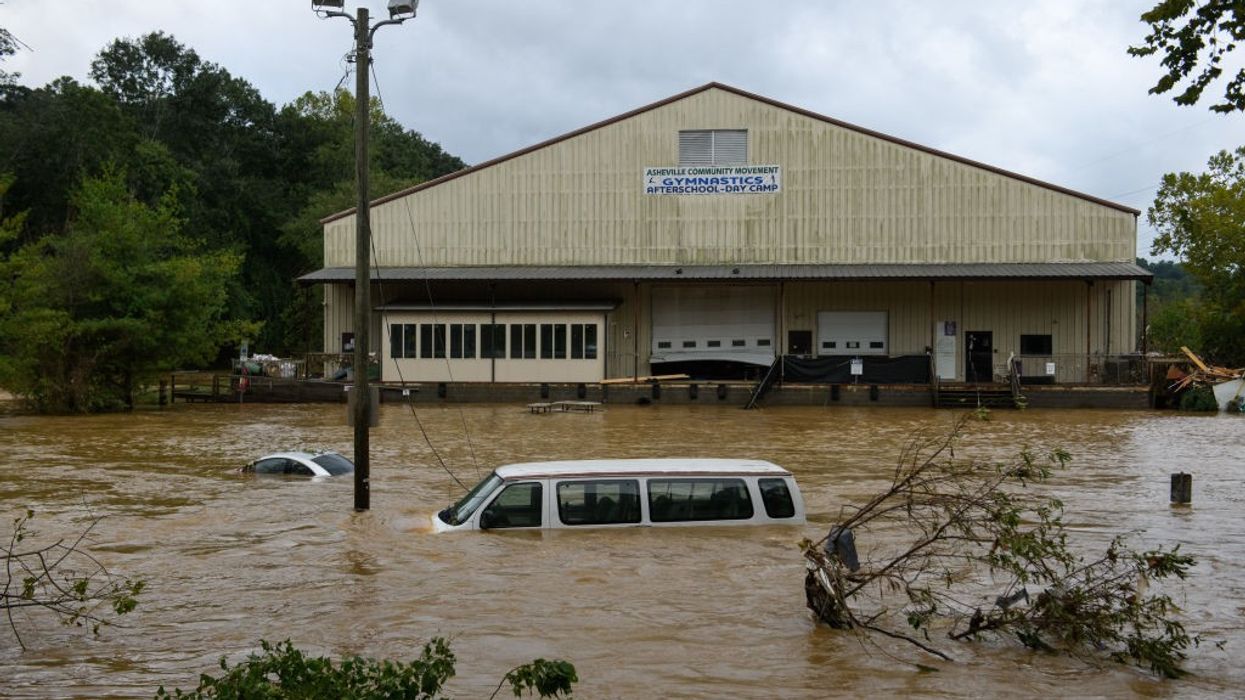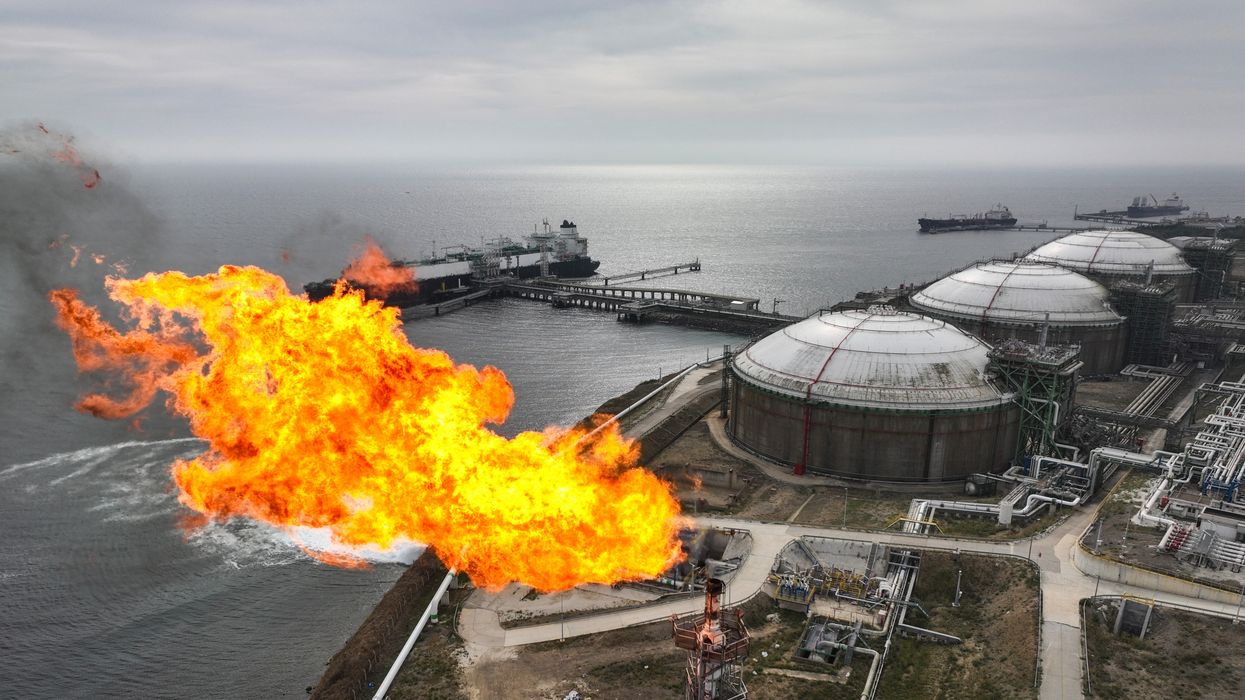Death and Destruction From Helene Show Climate Crisis Isn't in a Bargaining Mood
We’re in a terrible corner now. That’s what all those pictures of floating cars really means. We don’t have room left to make tradeoffs and deals.
If you want to understand the horror still unfolding in Appalachia, and actually if you want to understand the 21st century, you need to remember one thing: warm air holds more water vapor than cold.
As Hurricane Helene swept in across a superheated Gulf of Mexico, its winds rapidly intensified—that part is really easy to understand, since hurricanes draw their power from the heat in the water. And as Jeff Masters points out:
Helene’s landfall gives the U.S. a record eight Cat 4 or Cat 5 Atlantic hurricane landfalls in the past eight years (2017-2024), seven of them being continental U.S. landfalls. That’s as many Cat 4 and 5 landfalls as occurred in the prior 57 years.
But Helene also picked up ungodly amounts of water—about 7% more water vapor in saturated air for every 1°C of ocean warming. In this case, that meant the mountaintops along the Blue Ridge above Asheville were—according to Doppler radar measurement—hit with nearly 4 feet of rain. That meant that Asheville—listed recently by the national media as a “climate haven” and bulging with those looking for a climate-safe home—is now largely cut off from the world. The interstates in and out of the town were severed for a while over the weekend; the beautiful downtown is drowned in mud. It’s obviously much worse in the outlying towns up in the surrounding hills. People forget how high these mountains are—Mt. Mitchell, near Asheville, is the highest point east of the Mississippi (and, worth noting, the forests on its summit slopes have been badly damaged by acid rain).
I know how this works, because my home state of Vermont is mostly steep mountains and narrow valleys. Once the rain drops, it’s funneled very quickly down the saturated hillsides; placid streams become raging torrents that fill up those bottomlands, covering farm fields with soil; when the water starts to drain, everything is coated with mud. These towns are going to be cut off for a while—our mountain hamlet in Vermont was effectively isolated for a couple of weeks last summer. And these are places where cellphones don’t work in the best of times. Things get pre-modern very fast.
Were it happening just in one place, a compassionate world could figure out how to offer effective relief. But it’s happening in so many places. The same day that Helene slammed into the Gulf, Hurricane John crashed into the Mexican state of Guerrero, dropping nearly 40 inches of rain and causing deadly and devastating floods in many places including Acapulco, which is still a shambles from Hurricane Otis last year. In Nepal this afternoon at least 148 people are deadare dead and many still missing in the Kathmandu Valley. Just this month, as one comprehensive twitter thread documented, we’ve seen massive flooding in Turkey, the Philippines, Saudi Arabia, Spain, Marseilles, Milan, India, Wales, Guatemala, Morocco, Algeria, Vietnam, Croatia, Nigeria, Thailand, Greece, Romania, Poland, the Czech Republic, Austria, with the Danube hitting new heights across Central Europe. It is hard to open social media without seeing cellphone videos from the cars-washing-down-steep-streets genre; everywhere the flows are muddy-brown, and swirling with power.
But all that water has to come from somewhere—the extra vapor in the air implies that in some places water is disappearing skyward, and those stories are at least as dangerous, if not as dramatic in a daily way. (How do we know that drought is on the increase? That’s easy—a new “drought emoji” of a dead tree is about to be approved).
Brazilian president Lula traveled to the Amazon last week to highlight the intense drought gripping the region; it’s fueled fires that have covered as much as 60 percent of the county with smoke. It used to be that Amazon fires were mostly the work of prospectors and would-be farmers, using the dry season to get rid of the forest; now, though, many of the fires are burning in pristine areas far from active attempts at deforestation. It just gets dry enough that the rainforest can catch fire. As Manuela Andreoni reported in the Times, Lula’s new environment minister, the highly credible Marina Silva, has cracked down on the bad guys, but it hasn’t been enough to stop the burning
“Maybe 2024 is the best year of the ones that are coming, as incredible as it may seem,” said Erika Berenguer, a senior research associate at the University of Oxford. “The climate models show a big share of the biome is going to become drier.”
In essence, the Amazon rainforest is an exquisite mechanism for passing moisture from the ocean to the interior, but as more of the forest disappears that mechanism is quickly breaking down—and with implications for regions as far away as California.
All of this is a way of saying something I’ve said too many times before: we’re out of margin. We’re now watching the climate crisis play out in real time, week by week, day by day. (117 Fahrenheit in Phoenix yesterday, the hottest September temperature ever recorded there, smashing the old daily mark by…eight degrees).
This means that our political leaders are finally going to have to make hard choices (or not, which is its own way of choosing). Brazil, for instance, is hoping to drill for oil at the mouth of the Amazon—which at least, given Brazil’s relative poverty, is somewhat understandable, if still insane. America’s politicians, under much less economic pressure, are facing similar choices, some of them as soon as the lame duck session after the November elections. Expect, for instance, a renewed push to open up new permits for LNG export terminals along the Gulf Coast. Pausing those permits was the most important step the Biden administration took to rein in Big Oil, and Houston’s been outraged ever since; it’s why they’re pouring money into the Trump campaign. And it’s why they have their errand boys in the Congress—outgoing Senator Joe Manchin, Wyoming’s John Barrasso—proposing a trade: permitting reform that would make it easier to build renewable energy in America, in exchange for ramping up LNG exports that would undercut renewable energy in Asia.
The numbers on whether this trade “makes sense” are complicated and contentious. Here’s a report from Third Way arguing yes, here’s a set of charts from the veteran energy analyst Jeremy Symons arguing that it will dramatically raise gas prices for those American consumers still tied to propane. New peer-reviewed numbers from the gold-standard methane scientist Bob Howarth at Cornell make it clear that these LNG exports are worse than coal; that prompted 125 climate scientists to write to the administration asking them to “follow the science.”
In the end, this decision will likely come down to politics. It’s not just Big Oil that’s willing to make such a trade—New Mexico’s Martin Heinrich, in line to be Democratic leader on the Energy and Natural Resources Committee when Manchin yachts back to West Virginia, has come out for the trade, assuredly because New Mexico gets a large share of its government revenues from taxing the natural gas under its part of the Permian basin. Northeastern Democrats will vote against, fearing not just climate destruction but the rise in gas prices as we send the commodity abroad. Meanwhile, the good people of the Gulf suffer from the grievous local environmental impacts of these giant plants, and the amount of methane in the atmosphere keeps rocketing up.
If Trump wins, there’s no need for a deal—the LNG projects will be approved, and permitting reform for renewables will be dead. If Harris wins and the Dems hold the Senate, at least there’s a chance that environmentalists can make it easier to build solar and wind without yielding on the massive carbon bomb and EJ disaster that is LNG export. That’s why I’m in Montana today, trying in my small way to help Jon Tester in his uphill fight to retain a Senate seat. And it’s why I’m in the swing states most of the time between now and November 5. Thousands of Third Act volunteers are deploying themselves far and wide to win this contest—you can join us on the Silver Wave tour in Georgia, Arizona, Pennsylvania, and Nevada. (Please join us, even if you haven’t reached sixty yet—we don’t check IDs and we love working with young people).
The bottom line is, we’re in a terrible corner now. That’s what all those pictures of floating cars really means. We don’t have room left to make tradeoffs and deals; physics isn’t in a bargaining mood. Every battle is dishearteningly existential now.


